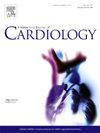Difficult-to-treat recurrent pericarditis after SARS-CoV-2 vaccination
IF 3.2
2区 医学
Q2 CARDIAC & CARDIOVASCULAR SYSTEMS
引用次数: 0
Abstract
Introduction
Pericarditis is a recognized but rare complication of Severe Acute Respiratory Syndrome Coronavirus 2 (SARS-CoV-2) vaccination. While most cases are self-limited, some develop recurrent, difficult-to-treat pericarditis, requiring prolonged management. The exact pathophysiology remains unclear, but vaccine-related immune activation and inflammasome-mediated responses have been implicated.
Methods
We reported eight cases of difficult-to-treat pericarditis temporally associated with SARS-CoV-2 vaccination, seen at a single center between October 2021 and January 2025. Diagnosis followed ESC 2015 guidelines, and all patients tested negative for acute SARS-CoV-2 infection.
Results
The median age was 56 years, with six receiving Pfizer-BioNTech BNT162b2 and two Moderna mRNA-1273. For six individuals, this was their first episode of pericarditis, whereas two had a prior history of pericarditis. The median time to symptom onset was 14 days. Chest pain was reported by all patients, requiring emergency visits in six cases. Pericardial effusion was present in six patients, with one progressing to tamponade. Cardiac magnetic resonance revealed pericardial late gadolinium enhancement in three of seven patients. All patients received nonsteroidal anti-inflammatory drugs and seven were treated with colchicine. Due to inadequate response to first-line therapies, corticosteroids were administered in all eight cases. Due to persistent symptoms, six patients initiated rilonacept therapy, which led to complete symptom resolution.
Conclusions
Pericarditis following SARS-CoV-2 vaccination can evolve into a recurrent, difficult-to-manage inflammatory condition. Effective treatment may require IL-1 blockade to disrupt the autoinflammatory cycle. Prompt recognition and early escalation of therapy are essential to reduce morbidity and prevent complications.
接种SARS-CoV-2疫苗后难治性心包炎复发
心包炎是严重急性呼吸综合征冠状病毒2 (SARS-CoV-2)疫苗接种后公认但罕见的并发症。虽然大多数病例是自限性的,但有些会复发,难以治疗的心包炎,需要长期治疗。确切的病理生理机制尚不清楚,但与疫苗相关的免疫激活和炎症小体介导的反应有关。方法我们报告了2021年10月至2025年1月在同一中心发现的8例与SARS-CoV-2疫苗接种暂时相关的难治性心包炎病例。诊断遵循ESC 2015指南,所有患者急性SARS-CoV-2感染检测均为阴性。结果中位年龄为56岁,其中6例接受辉瑞- biontech BNT162b2治疗,2例接受Moderna mRNA-1273治疗。对于6个个体,这是他们的第一次心包炎发作,而2个有心包炎病史。到出现症状的中位时间为14天。所有患者均报告胸痛,其中6例需要急诊。6例患者有心包积液,其中1例进展为心包填塞。心脏磁共振显示7例患者中有3例心包晚期钆增强。所有患者均接受非甾体抗炎药治疗,其中7例接受秋水仙碱治疗。由于对一线治疗反应不足,所有8例患者均给予皮质类固醇治疗。由于症状持续,6例患者开始利洛那普治疗,导致症状完全缓解。结论接种SARS-CoV-2后的心包炎可演变为复发性、难治性炎症。有效的治疗可能需要阻断IL-1来破坏自身炎症周期。及时识别和早期升级治疗对于减少发病率和预防并发症至关重要。
本文章由计算机程序翻译,如有差异,请以英文原文为准。
求助全文
约1分钟内获得全文
求助全文
来源期刊

International journal of cardiology
医学-心血管系统
CiteScore
6.80
自引率
5.70%
发文量
758
审稿时长
44 days
期刊介绍:
The International Journal of Cardiology is devoted to cardiology in the broadest sense. Both basic research and clinical papers can be submitted. The journal serves the interest of both practicing clinicians and researchers.
In addition to original papers, we are launching a range of new manuscript types, including Consensus and Position Papers, Systematic Reviews, Meta-analyses, and Short communications. Case reports are no longer acceptable. Controversial techniques, issues on health policy and social medicine are discussed and serve as useful tools for encouraging debate.
 求助内容:
求助内容: 应助结果提醒方式:
应助结果提醒方式:


